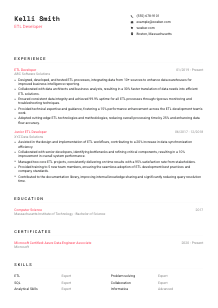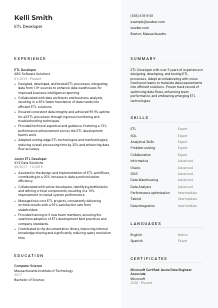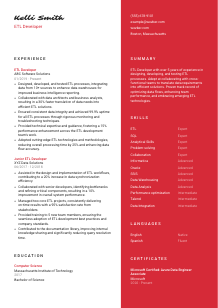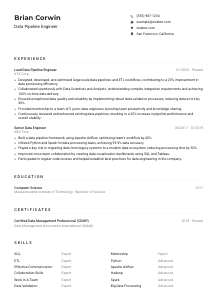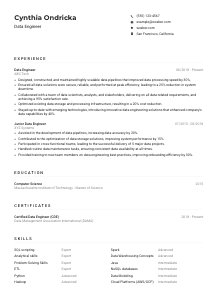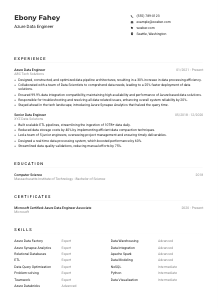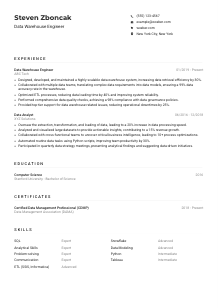ETL Developer CV Example
Scripting data flows, but your CV is stuck in a transformation limbo? Dive into this ETL Developer CV example, shaped with Wozber free CV builder. See how you can extract, transform, and load your skills to align precisely with job specifics, ensuring your career path is always a streamlined data journey!
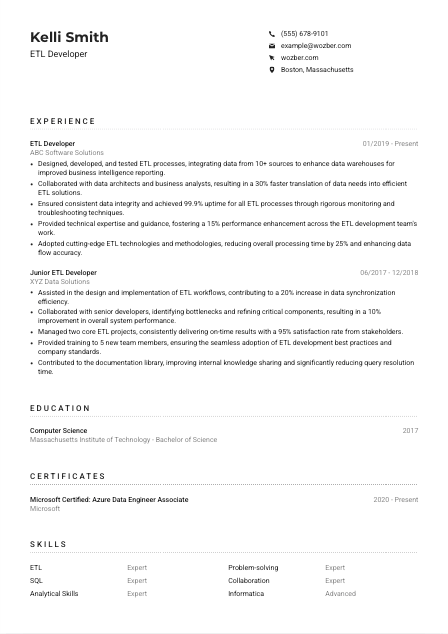
How to write an ETL Developer CV?
Stepping into the world of ETL Development means you're ready to tackle complex data and transform it into actionable insights. But to grab that ideal role, your CV needs to shine brighter than a well-executed data flow. Leveraging Wozber's free CV builder, let's unravel the art of creating an ETL Developer CV that's not just a document, but a passport to your dream job. Tailoring your CV to the job you desire can be a game changer.
Together, we're about to make your application not only ATS-compliant but irresistible to hiring managers. Ready to transform your professional narrative?
Personal Details
Let's kick things off with the personal details - your first handshake with the hiring manager. For an ETL Developer, making an impactful introduction is key. Follow these steps to ensure your personal information section is as polished and precise as a well-configured data connection.
1. Brand Yourself with Your Name
Your name is not just an identifier; it's your professional brand. Make sure it's clearly visible and set apart with a larger font size. Consider this like setting up your primary key in a database: unique and easily identifiable.
2. Professionally Present Your Title
Align your job title with the position you're applying for right beneath your name. This strategically places "ETL Developer" at the forefront, creating an immediate professional connection with the position.
3. Craft Contact Information Wisely
Your phone number and email should be modern-day access points. Ensure the email sound professional – akin to choosing the right data type for a field, it must correctly represent the value you're storing, in this case, your professionalism.
4. Location Matters
Given that our job stipulates a Boston, Massachusetts location, including it verifies you're in the data pool they're fishing from. Just as data validation ensures quality input, this assures your potential employer of your logistical fit.
5. Optional Professional Links
Think of your LinkedIn profile as a database view – it provides a dynamic, detailed perspective on your professional landscape. Ensure it's updated and reflects your CV accurately.
Takeaway
Your personal details section is your first chance to make a strong impression. By aligning each element with the role's specifics, like carefully designing your database schema, you're ensuring clarity, relevance, and professionalism. Remember, always keep it professional and directly aligned with the ETL Developer role you're targeting.





Experience
Now, let's dive deep into the core dataset – your experience. For an ETL Developer, translating raw data (past roles) into insightful reports (CV bullets) is crucial. A well-structured Experience section is your best opportunity to demonstrate relevancy and expertise.
- Designed, developed, and tested ETL processes, integrating data from 10+ sources to enhance data warehouses for improved business intelligence reporting.
- Collaborated with data architects and business analysts, resulting in a 30% faster translation of data needs into efficient ETL solutions.
- Ensured consistent data integrity and achieved 99.9% uptime for all ETL processes through rigorous monitoring and troubleshooting techniques.
- Provided technical expertise and guidance, fostering a 15% performance enhancement across the ETL development team's work.
- Adopted cutting‑edge ETL technologies and methodologies, reducing overall processing time by 25% and enhancing data flow accuracy.
- Assisted in the design and implementation of ETL workflows, contributing to a 20% increase in data synchronization efficiency.
- Collaborated with senior developers, identifying bottlenecks and refining critical components, resulting in a 10% improvement in overall system performance.
- Managed two core ETL projects, consistently delivering on‑time results with a 95% satisfaction rate from stakeholders.
- Provided training to 5 new team members, ensuring the seamless adoption of ETL development best practices and company standards.
- Contributed to the documentation library, improving internal knowledge sharing and significantly reducing query resolution time.
1. Dissect the Job Requirements
Like analyzing data trends, start by dissecting the job requirements. Highlight keywords and experiences that match your own. These are your primary attributes in the data model of your CV.
2. Organize Chronologically
Structure your experience like a well-ordered database, with the most recent positions upfront. Think of each position as a separate table - clear, distinct, and organized.
3. Tailor Achievement Statements
Quantify your achievements, and relate them directly to the job's needs. Statements like 'Optimised data flow, reducing processing time by 25%' resonate with your audience by showing tangible outcomes.
4. Quantify and Qualify
Whenever possible, bolster your statements with data. Quantifying achievements provides a measurable impact, much like indexing a database enhances performance insights.
5. Relevance is Key
Highlight experiences most relevant to ETL Development. Non-relevant experiences might seem like corrupt data entries in an otherwise clean dataset – distracting and potentially misleading.
Takeaway
Crafting a compelling Experience section on your CV is akin to developing an efficient, error-free ETL process. It's about showcasing how you've transformed data, solved problems, and optimised performance in the past. Aim to present yourself as the solution to the hiring manager's needs.
Education
In the realm of ETL Development, your education is the foundation of your data stack. Here's how to construct an Education section that not only meets the basic requirements but also adds value to your candidacy.
1. Identify Key Education Requirements
First, pinpoint the educational credentials the job listing emphasizes. In our case, a Bachelor's degree in Computer Science or a related field is non-negotiable. Ensure this is listed clearly and matches the requirement verbatim.
2. Structure with Clarity
Organize your educational background in a simple, readable format. Think of this section as the schema for a new database – each element should have its place and purpose, from the degree name to the institution attended.
3. Echo Job Requirements
For an ETL Developer role, directly aligning your degree with the job's stated requirements can significantly boost your CV's relevance. If you majored in Computer Science, highlight it prominently.
4. Relevant Courses and Projects
If you're early in your career, supplementing your degree with relevant coursework can be extremely valuable. Listing a project where you used ETL tools, for example, demonstrates practical experience and initiative.
5. Showcase Achievements
Did you graduate with honors, or were you part of a tech club? Such achievements can enhance your educational narrative, showcasing a well-rounded candidate keen on excellence beyond just academics.
Takeaway
Your education section should reflect a solid foundation in the field, aligned with the role's requirements. It's your chance to demonstrate you have the theoretical knowledge and the initiative to apply it. Every detail counts, presenting you as a candidate of high caliber and relevance.
Certificates
In the fast-paced world of technology, certifications are golden. They highlight your commitment to staying on top of industry trends and mastering new tools. For an ETL Developer, certain certifications can significantly bolster your desirability.
1. Match with Job Necessities
Though our job description didn't specify certifications, including relevant ones like 'Microsoft Certified: Azure Data Engineer Associate' directly correlates with industry standards and shows proactive learning.
2. Quality Over Quantity
It's tempting to list all your certifications, but focus on those most relevant to ETL Development. This demonstrates to the hiring manager that you're not just a collector of titles, but a focused professional.
3. Date Matters
Include the acquisition date for recent certificates to show that your knowledge is current. In the tech field, staying updated is key, so let the hiring manager see you're keeping pace with the changes.
4. Pursue Continuous Learning
Even if you're a seasoned professional, there's always something new to learn. Mentioning ongoing certification pursuits can be an excellent way to show your dedication to professional growth and development.
Takeaway
Think of certifications as badges validating your expertise and dedication to your craft. Selectively showcasing relevant certifications on your CV tells hiring managers that you're a committed, knowledgeable professional eager to bring your best to the role.
Skills
The Skills section of your CV is where you get to shine a spotlight on your technological prowess and soft skills, intricately weaving them into a compelling narrative. Let's ensure your skills palette paints you as the ultimate ETL Developer.
1. Extract from Job Description
Like filtering data for analysis, begin by extracting both hard and soft skills from the job description. Words like 'SQL', 'ETL', and 'analytical skills' are keys to unlocking ATS compliance.
2. Align and Prioritize
Rank your skills in order of relevance to the ETL Developer position, ensuring the most critical ones catch the hiring manager's eye first. Think of it as sorting data to highlight the most pertinent records.
3. Be Selective
Resist the urge to list every skill you possess. Instead, focus on those most pertinent to ETL development, accentuating your suitability for the role. It's about quality, not quantity.
Takeaway
In a field as competitive as ETL Development, your skills are your arsenal. Showcase the technologies and personal attributes that make you stand out, using the job description as your compass. This selective, strategic approach makes your CV not just a list, but a targeted pitch for why you're the best candidate.
Languages
The global nature of technology means that language skills can be a valuable asset, especially when communicating across time zones and cultures. Let's configure your language proficiency in a way that enhances your candidacy.
1. Understand Requirements
For our ETL Developer role, proficiency in English is a stated requirement. Ensure you list English at the top and rate your proficiency accurately - think of it as setting a primary locale for a software application.
2. Showcase Your Linguistic Repertoire
If you know additional languages, list them down with an honest assessment of your proficiency. Each language you speak is like an additional database query language you know - a handy tool in your tech toolbox.
3. Be Honest
Accurately assess your proficiency level for each language. Overestimating your fluency can lead to expectations you may not meet, similar to overpromising in a project scope.
4. Tailor to the Job
While the role focuses on ETL Development, ancillary skills like additional languages can set you apart in a diverse workplace or when handling multinational data sets.
5. Understand the Broader Implications
Languages go beyond mere communication; they're a testament to your adaptability and cultural sensitivity - key soft skills in today's global job market.
Takeaway
In your CV, languages demonstrate not just your communication skills but also your capacity to engage with diverse teams and datasets. Like a well-structured database, your multilingual abilities can enhance the richness and utility of your professional offerings.
Summary
Crafting a powerful summary is like writing an efficient query that quickly tells you everything you need to know about a dataset. For your ETL Developer CV, your summary is where you present your professional identity, honed over years of experience and learning.
1. Capture the Job's Essence
Start by understanding the core of the ETL Developer position. What are the key tasks and required skills? This understanding will frame your summary, highlighting your alignment with these needs.
2. Begin with a Strong Introduction
Introduce yourself by stating your professional status and years of experience. For example, 'ETL Developer with over 5 years of experience...' immediately outlines your expertise in the field.
3. Highlight Your Unique Offerings
What sets you apart as an ETL Developer? Is it your knack for data optimisation? Your seamless collaboration with cross-functional teams? Your summary is the place to illuminate these unique traits.
4. Keep It Concise
Aim for a brief yet potent summary, hooking the hiring manager's interest. Think of this as your personal 'elevator pitch' – a snapshot of your professional persona that entices them to read on.
Takeaway
Your summary is the first opportunity to engage the hiring manager and assure them of your value as an ETL Developer. Tailor it to reflect your unique strengths and how they align with the job at hand. Keep it succinct, compelling, and reflective of your experiences and achievements.
Embarking on Your ETL Developer Journey
Congratulations on completing your guide to crafting a standout ETL Developer CV. Using Wozber's free CV builder, including its ATS-compliant CV templates and ATS CV scanner, you're now prepared to transform your application from a simple document into a compelling narrative that showcases your abilities. Remember, the goal is not just to tell but to engage and convince. Let your CV be the key that unlocks the door to your next big opportunity.
The data stories you're destined to tell are just beyond. Ready, set, ETL!

- Bachelor's degree in Computer Science, Information Technology, or a related field.
- Minimum of 3 years of experience in ETL development using tools such as Informatica, Talend, or SSIS.
- Proficiency in SQL and experience with relational databases such as Oracle, SQL Server, or MySQL.
- Strong analytical and problem-solving skills, with the ability to optimize ETL processes for improved efficiency and performance.
- Effective communication skills and ability to collaborate with cross-functional teams.
- Ability to communicate professionally in English is required.
- Must be located in Boston, Massachusetts.
- Design, develop, and test ETL processes to integrate data from multiple sources into data warehouses and data marts.
- Collaborate with business users and data architects to understand data requirements and translate them into ETL solutions.
- Monitor and troubleshoot ETL processes, ensuring data integrity and performance consistency.
- Provide technical expertise and guidance to the ETL development team.
- Stay updated with emerging ETL technologies and best practices to drive continuous improvement.





